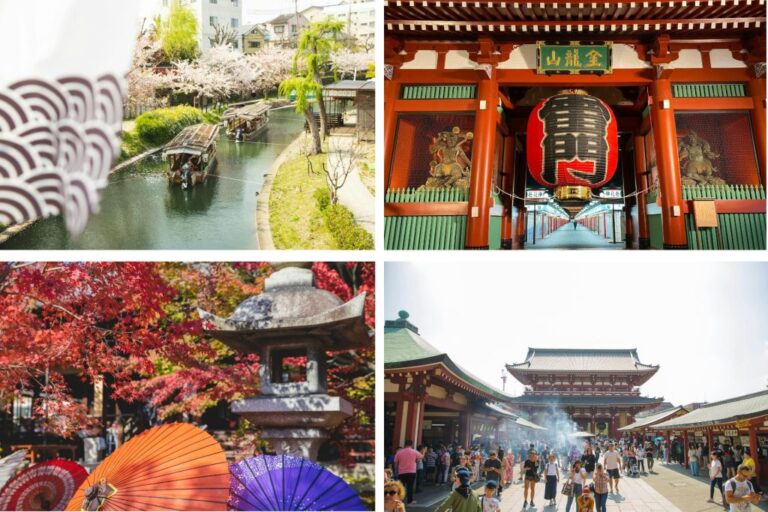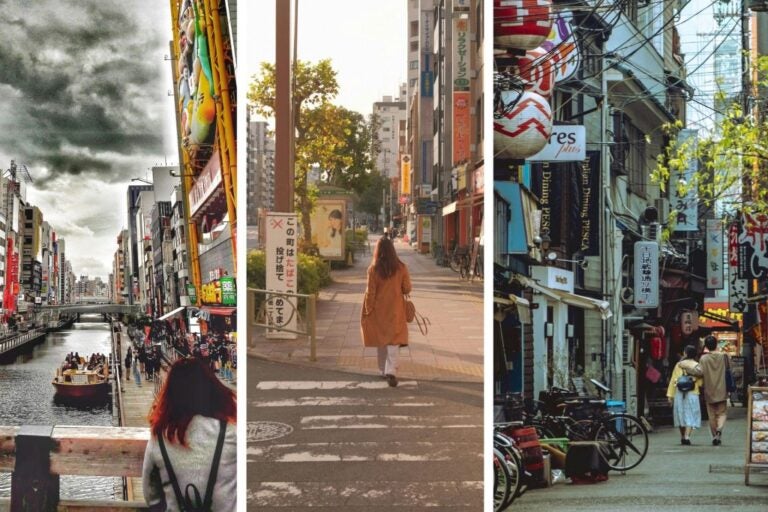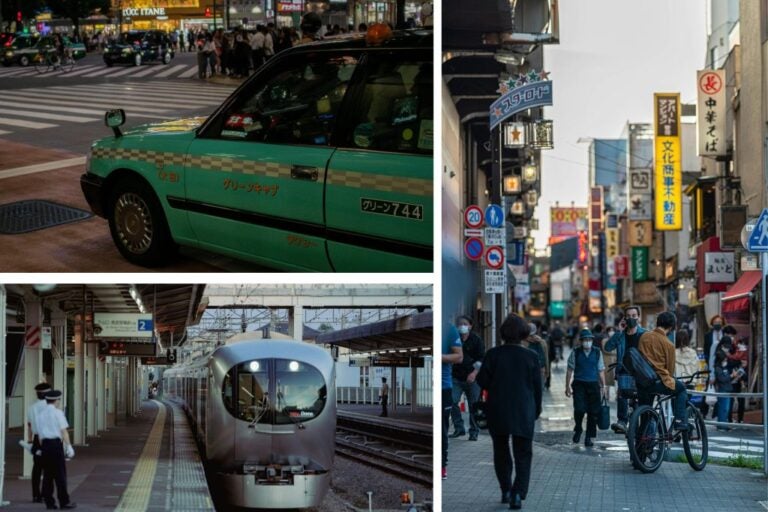How to Become a Digital Nomad in Japan: A Complete Guide
Would you like to live in Japan as a digital nomad? Keep this guide where we resolve all your doubts about residing legally in this country.
Japan is a fascinating destination for digital nomads seeking a unique combination of cutting-edge technology, rich culture and an excellent infrastructure for working online. With its diverse range of cities, from futuristic Tokyo to traditional Kyoto, the country offers a balanced experience of dynamism and serenity, ideal for those wishing to live and work abroad. Connectivity, quality public transport and security are some of the major attractions that draw many remote workers to this Asian country.
What’s more, there is a growing supply of coworking and co-living spaces in Japan, facilitating the integration of digital nomads into everyday life. Japanese culture, with its focus on efficiency and mutual respect, creates a work environment conducive to those seeking a stable and organised destination. Don’t know what to bring with you to this country? Take note of the tips we give in our post: What to pack as a digital nomad?
Why choose Japan to live as a digital nomad?
Japan is a country noted for its advanced technology, safety and quality of life. Digital nomads can enjoy an efficient transport system, high-speed internet access and a culture that blends modernity and tradition. We recommend the Holafly eSIM so you can always stay connected in the Asian country with unlimited data. Networking opportunities are extensive, especially in large cities such as Tokyo and Osaka, where there are active communities of international professionals. It is also an extremely safe country, allowing remote workers to enjoy peace of mind during their stay.
Another highlight is the ease of connecting to other destinations in the region, as Japan is a hub in Asia, with frequent flights to other major cities such as Seoul, Hong Kong and Singapore. You certainly won’t have a chance to get bored in this interesting country, so let’s discover in detail how to settle in Japan as a digital nomad.

Visas allowing legal residence in Japan
As of March 2024, Japan has had a visa for digital nomads. In addition to this visa, you may be eligible for other types of permits, depending on your personal circumstances and the length of time you plan to stay in the country. It is important to find out about renewals and extension options, as in some cases you may be able to switch to another type of visa while residing in the country. The rules vary depending on nationality and visa type. For digital nomads, the most common options include:
| Visa Type | Features | Duration |
|---|---|---|
| Digital Nomad Visa | It offers the opportunity to work remotely from Japan, the visa does not allow you to register residency or obtain a residence card. You must prove income of at least ¥10 million (about $68,300). | 6 months |
| Tourist visa | It allows foreigners to work remotely. It does not permit local employment. | Up to 90 days |
| Work visa | This requires a sponsor in Japan and is targeted at specific jobs. | 1-3 years |
| Working Holiday Visa | Available for certain countries, it allows you to work temporarily in Japan. | 1 year |
Where to live and work as a digital nomad in Japan
1. Main cities
- Tokyo: The capital is a hive of activity and technology. It is the ideal place for those looking for a modern environment with ample coworking and co-living options.
- Kyoto: If you prefer a quieter atmosphere, Kyoto offers a rich cultural tradition and more relaxed surroundings, but with high connectivity.
- Osaka: Offering an excellent quality of life and a growing international community, Osaka has a calmer atmosphere than Tokyo, whilst still being a vibrant destination.

2. Accommodation
Accommodation options for accommodation options for digital nomads in Japan are wide and varied, catering to different budgets and lifestyles. Some notable co-living spaces include ROAM Tokyo, which offers a collaborative and comfortable environment in the capital, and The Hive Jinnan in Shibuya, ideal for those looking for a more modern and central experience. Another space is ANCHOR Co-living Fukuoka, located in a booming city for digital nomads, which combines community and convenience.
In terms of hotels, popular options include The Millennials Shibuya, a modern capsule hotel in Tokyo designed for remote workers with shared workspaces. There is also Nine Hours, a chain of minimalist capsule hotels spread across several major cities in the country, offering comfort at a reasonable price for short stays.
3. Coworking spaces
Japan also has a wide variety of coworking spaces. Prices vary between 20 and 50 euros per day, depending on the city and the space. There are also several public libraries and cafés with good internet connections, ideal for informal work. In Tokyo, for example, some of the most popular coworking spaces are:
- WeWork (various locations)
- Tokyo Impact Centre
- MOV Creative Salon
Taxes to be aware of in Japan
Japan has a tax structure that can directly impact digital nomads, depending on their nationality and length of stay in the country. It is essential to understand the tax obligations for digital nomads to avoid surprises and ensure that you comply with local regulations.
1. Local taxes for a digital nomad in Japan
The general rule in Japan is that anyone who resides in Japan for more than 183 days in a tax year is considered a tax resident. If you are a digital nomad beyond this period, you may be liable to pay tax on your global income, which means that you will have to declare any income earned both domestically and abroad. However, if your stay is shorter than this, you may only be liable to pay tax on income generated within Japan. For shorter stays, digital nomads may not be subject to full tax reporting, depending on their agreement with their home country.
2. Double taxation treaties
Japan has double taxation agreements with many countries, which helps to avoid paying tax twice on the same income. This is especially relevant if your home country has a treaty with Japan, as you may benefit from tax deductions or exemptions, thus reducing the impact of paying taxes both in your home country and in Japan. To find out in detail how these treaties work and to see if your country is included, you can check the official list of Japan’s bilateral tax treaties. If your country has a treaty, you can claim the corresponding tax credit or exemption on your tax return, which will reduce the total tax burden on your overall income.
Important: If you are a frequent traveler and want to stay connected without worrying about expensive roaming or looking for a new SIM at every destination, Holafly’s subscription plans are for you. With a single eSIM, enjoy internet in more than 170 countries for a fixed price and no surprises on your bill. Travel without limits and connect easily and securely! 🚀🌍

Health insurance and quality of health service
In Japan, digital nomads have access to both public and private healthcare systems. While the public system covers most essential treatments, many prefer to purchase private insurance to have access to a larger network of hospitals and clinics. The quality of medical care in Japan is high, with modern facilities and trained professionals. Most hospitals and clinics in large cities have English-speaking doctors, which facilitates communication.
1. Hospitals in Japan
- Tokyo University Hospital: This hospital is renowned for excellence in medical research and care in a wide range of specialties.
- St. Luke’s International Hospital (Tokyo): A private hospital that is known for its excellent care and multilingual staff, making it easily accessible to foreigners.
- Osaka University Hospital: One of the leading university hospitals in the Kansai region, offering advanced medical care in multiple specialties.
2. Health insurance in Japan
- Public health insurance: Japan has a national health insurance (NHI) system, which is available to anyone residing in the country for more than three months. This insurance covers approximately 70% of the medical costs.
- International private insurance: For digital nomads who do not wish to enrol in national insurance or who are in Japan for less than three months, a viable option is international private health insurance. Companies such as Cigna and Allianz offer tailored plans for expatriates and remote workers, covering medical care in Japan and other countries.
Daily life in Japan
1. Transport and mobility
Public transport in Japan is very efficient and varied. To drive, you will need an international driver’s licence (IDP) if you use your foreign licence. If you plan to stay long-term, you can convert your licence, although this requires passing a driving test.
The Shinkansen, or bullet train, is famous for its speed and comfort, making it easy to travel between cities. In addition, IC cards such as Suica and Pasmo are ideal for use on trains and buses. Large cities such as Tokyo and Osaka have metro and bus networks that are easy to navigate. While taxis are a convenient option, car-sharing services such as Uber are less common. This approach to transport allows digital nomads to enjoy Japan’s rich culture with ease.

2. Financial management
In Japan, some of the most recommended banks for foreigners are Shinsei Bank, SBI Sumishin Net Bank and Mitsubishi UFJ. These banks usually offer services in English and allow accounts to be opened easily. What’s more, digital banks such as Revolut and Wise are popular options for managing finances, as they offer good exchange rates and low fees for international transactions.
For cash withdrawals, most ATMs are available in banks, shops and airports. However, be aware that some ATMs may not accept foreign cards, so using ATMs that indicate that they accept international cards is advised. International usage charges may vary, so it is important to check with your bank about possible fees.
3. Food
Shopping in Japan is easy thanks to the wide availability of supermarkets and convenience stores such as 7-Eleven, Lawson and FamilyMart, which offer fresh produce and ready-made meals at good prices. Meal prices can vary, but on average, a meal at a casual restaurant can cost between 800 and 1,500 yen (5.20 and 9.75 euros). For digital nomads, izakaya and ramen-style restaurants are popular choices offering delicious food at reasonable prices. There are also more well-known restaurants such as McDonald’s and KFC, but enjoying local food is always a recommended experience.
4. Leisure and free time
In Japan, there is a wide variety of leisure activities you can enjoy. For those looking to stay active, there are many gyms available in the cities, as well as facilities for sports such as basketball, football and baseball. There are also opportunities for hiking, especially in areas such as Mount Fuji and the Japanese Alps, which offer scenic and challenging routes.
Japan is also famous for its rich culture and festivals. Some of the highlights include Hanami (cherry blossom viewing) in spring, the Gion Matsuri in Kyoto and the Awa Odori, a dance festival in Tokushima. These events are a great opportunity to interact with the local culture and meet other digital nomads and residents.
5. Best seasons to be in Japan
Japan’s climate varies from region to region, but in general, the country experiences four distinct seasons. Spring (March to May) is considered one of the best times to visit, as the weather is mild and the cherry blossoms are in bloom. Other pleasant seasons include autumn (September to November), when the leaves change colour and offer breathtaking views.
Summer (June to August) can be hot and humid, especially in areas such as Tokyo and Osaka, which could affect your experience living as a digital nomad. However, it is an exciting time because of the many festivals and outdoor activities. Winter (December to February) brings snow to regions such as Hokkaido, ideal for skiing and winter sports enthusiasts.
Cost of living as a digital nomad in Japan
The cost of living in Japan can vary greatly depending on the city and the lifestyle you choose. However, in general, it can be said that living as a digital nomad in Japan involves certain expenses that need to be considered in order to maintain a comfortable lifestyle. We help you to know in detail what expenses you should face.
1. Accommodation
Accommodation prices are one of the biggest expenses when planning a trip to Japan. In cities such as Tokyo and Osaka, a one-bedroom flat in the city centre can cost between 800 and 1,200 euros per month. Co-living options typically range from 300 to 600 euros, depending on the facilities and location.
2. Food
Food costs in Japan also vary. Eating in a casual restaurant can cost between 5.20 and 9.75 euros, while a meal in a mid-range restaurant could cost between 20 and 40 euros. Grocery shopping can cost around 200-300 euros per month, depending on your shopping habits.
3. Transport
Public transport in Japan works very well and is quite cheap. A monthly pass for trains and buses can cost between 70 and 120 euros, depending on the city and the distance travelled. Also, if you prefer to get around by bike, many cities have rental options at similar prices.
4. Leisure and entertainment
Leisure activities, such as going to the cinema or dining out, can add up to 100-200 euros per month. Gym memberships usually cost between 30 and 70 euros. Cultural activities and festivals are plentiful, and admission is often free or low-cost.
In conclusion, a digital nomad in Japan can expect to face an average monthly living cost varying between 1,500 and 2,500 euros, depending on their lifestyle and decisions on which city to stay in. Think you can afford it? If your dream is to experience Asian culture in depth, Japan is waiting for you with open arms.





 Language
Language 


















 No results found
No results found







